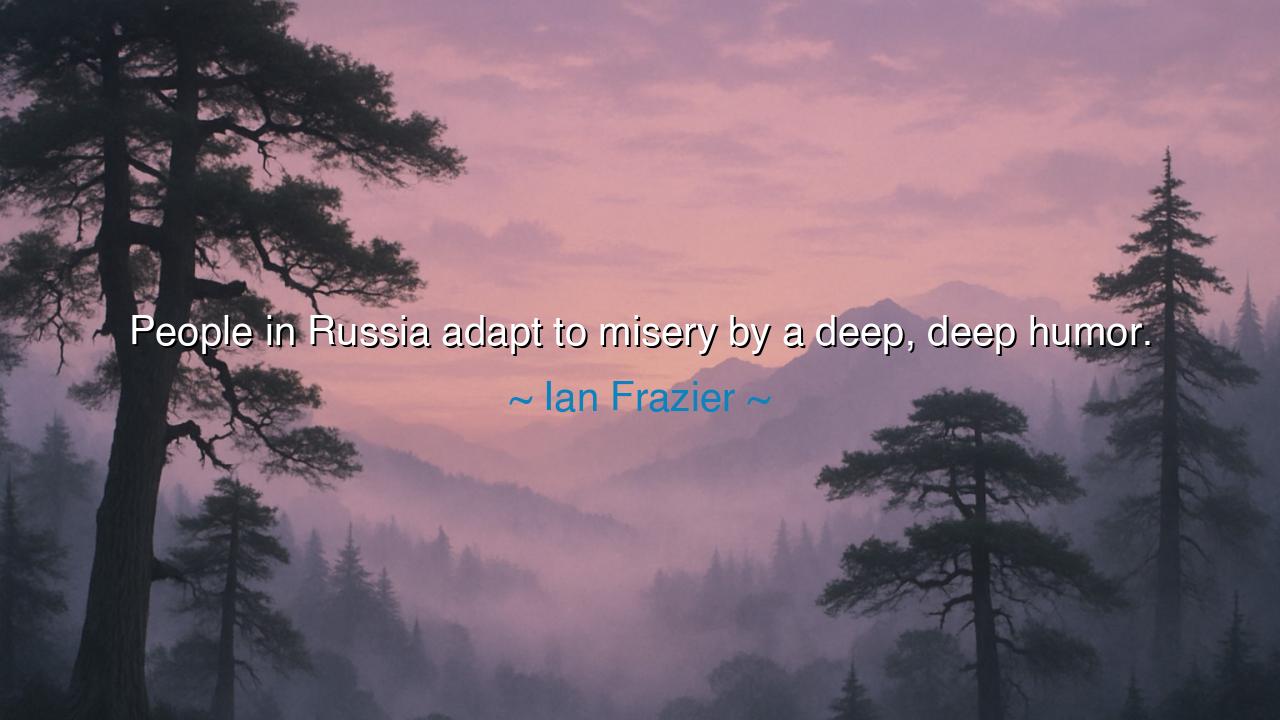
People in Russia adapt to misery by a deep, deep humor.






Hear the words of Ian Frazier, the traveler and chronicler of the human spirit: “People in Russia adapt to misery by a deep, deep humor.” In this brief but powerful truth lies an ancient wisdom, for it speaks not only of a nation, but of the resilience that dwells within all humankind. Through this observation, Frazier reveals that laughter is not born only of joy—it is also born of endurance. When life becomes harsh, when suffering presses upon the soul like the weight of winter, humor becomes not an escape, but a rebellion. It is the spirit’s quiet defiance against despair.
The people of Russia, whose land has known both magnificence and misery, have long understood this truth. Their humor is not the light laughter of the carefree, but a deep, resonant mirth carved from suffering. It is the kind of laughter that comes after tears—the laughter that says, “We are still alive.” It is a shield, a song, a form of courage. For Frazier, who journeyed through the vast and solemn expanse of Russia, this humor was not mere entertainment; it was a survival instinct. It was the human soul refusing to be broken by the cold, by oppression, or by time.
Such humor, born from hardship, has appeared throughout the ages. The ancient Greeks, who faced both famine and war, called it tragicomedy—the laughter that follows tragedy, not to mock it, but to contain it. In every age, those who have suffered most have also learned to laugh most wisely. It is said that when prisoners were held in the frozen camps of Siberia, they told jokes about their guards, their hunger, and even their deaths. Their laughter did not make their chains lighter, but it made their spirits freer. It was an act of invisible resistance, an assertion that even in captivity, the mind and heart could not be conquered.
Consider the story of Viktor Frankl, a man who endured the unspeakable horrors of the Nazi concentration camps. Though he was not Russian, his wisdom mirrors Frazier’s insight. Frankl observed that those who survived longest were not always the strongest in body, but those who could find meaning, and sometimes even humor, amid despair. He wrote, “Humor, more than anything else in the human make-up, can afford an aloofness and an ability to rise above any situation, even if only for a few seconds.” In this we see the same truth: that laughter is the breath of freedom in the lungs of the oppressed.
The origin of Frazier’s observation comes from his journeys through the vast land of Russia—its frozen villages, its forgotten roads, its people scarred by history yet glowing with a strange, indomitable warmth. He found in them a humor so dry and profound that it seemed carved from the tundra itself. In their jokes, there was grief; in their laughter, endurance. A Russian might say, “Things are so bad, they could get worse—but probably will.” And in that phrase lies not cynicism, but clarity. Their humor does not deny suffering—it accepts it, transforms it, and by doing so, transcends it.
This deep humor is a lesson for all who live in dark times. When misery visits, we have two choices: to let it harden us or to let it deepen us. The Russians, as Frazier saw, have chosen depth. Their humor digs into pain not to escape it, but to understand it. In laughter, they reclaim their humanity. And so can we. To find humor in suffering is not to disrespect it, but to master it—to declare that though sorrow may come, it will not have the final word.
Let this be a teaching to all who hear: seek the laughter that liberates, not the laughter that denies. When you face hardship, find a way to smile—not because life is easy, but because you are greater than your pain. Tell the story of your struggle with warmth and irony, and you will discover that every tear can be transformed into wisdom. For laughter, when drawn from truth, becomes the light that guides the weary through the storm.
And so remember the wisdom of Ian Frazier: “People in Russia adapt to misery by a deep, deep humor.” Let it remind you that laughter, born of endurance, is one of the highest forms of strength. The soul that can laugh through suffering is unconquerable. For misery passes, as all things pass, but humor—that quiet flame of defiance—burns eternal in the hearts of those who refuse to surrender their joy.






AAdministratorAdministrator
Welcome, honored guests. Please leave a comment, we will respond soon